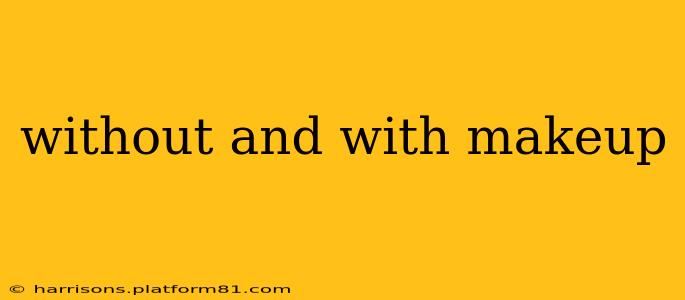The Transformative Power of Makeup: Without and With
Makeup. The word itself conjures up images of transformation, confidence, and artistry. But the debate surrounding its use – whether it's empowering or restrictive – continues to spark conversation. This article explores the multifaceted nature of makeup, examining the differences between a bare-faced look and a made-up one, and addressing common questions surrounding its application and impact.
Whether you're a makeup enthusiast or prefer a natural look, understanding the nuances of makeup application and its effect on your appearance can help you feel more confident and comfortable in your own skin.
What's the difference between a "no-makeup" look and wearing makeup?
The primary difference lies in the intentional enhancement of features. A "no-makeup" look emphasizes natural beauty by focusing on skincare and healthy habits that promote a radiant complexion. Wearing makeup, on the other hand, involves using products to alter or enhance features, creating a specific aesthetic. This can range from subtle enhancements to dramatic transformations. The key distinction isn't the presence or absence of products, but the intention behind their use. A tinted moisturizer or a touch of mascara can still be considered makeup if used to enhance one's appearance deliberately.
What are some tips for achieving a natural "no-makeup" look?
Achieving a flawless "no-makeup" look relies heavily on healthy skin. Prioritize a good skincare routine that includes:
- Cleansing: Remove dirt, oil, and makeup thoroughly each night.
- Exfoliating: Regular exfoliation removes dead skin cells, revealing brighter, smoother skin.
- Moisturizing: Hydrated skin looks healthier and more radiant. Choose a moisturizer suited to your skin type.
- Sunscreen: Protecting your skin from sun damage is crucial for long-term skin health and preventing premature aging.
Beyond skincare, consider using a tinted moisturizer or BB cream for minimal coverage to even out your skin tone. A touch of brow gel can help define your brows naturally, and a lip balm can add a touch of color and hydration to your lips. The focus is on enhancing your natural features subtly, rather than masking them.
What are the benefits of wearing makeup?
The benefits of wearing makeup are primarily subjective and depend on individual preferences and intentions. However, some commonly cited benefits include:
- Increased Confidence: Many people find that makeup boosts their self-esteem and confidence.
- Creative Expression: Makeup can be a powerful tool for self-expression and creativity, allowing individuals to explore different styles and aesthetics.
- Camouflage: Makeup can be used to camouflage blemishes, scars, or other imperfections, providing a sense of security and comfort.
- Protection: Some makeup products offer sun protection (SPF), shielding the skin from harmful UV rays.
It's crucial to remember that the benefits of makeup are entirely personal. Feeling good in your own skin, with or without makeup, is the ultimate goal.
How can I choose the right makeup for my skin tone and type?
Choosing the right makeup involves understanding your skin type (oily, dry, combination, sensitive) and skin tone (undertones: warm, cool, neutral). Consider these factors:
- Foundation: Choose a foundation that matches your skin tone and provides the right level of coverage for your needs.
- Concealer: Select a concealer that addresses specific concerns like dark circles or blemishes.
- Powder: Set your makeup with a powder to control shine and extend wear.
- Blush/Bronzer: Enhance your features with blush or bronzer to add warmth and dimension.
Experimenting with different products and techniques is key to finding what works best for you. Seek professional advice at makeup counters or consult online tutorials for guidance.
Is wearing makeup unhealthy?
The health impacts of makeup depend largely on the products used and the individual's skin sensitivity. Using high-quality, non-comedogenic (non-pore-clogging) products is crucial to minimize the risk of breakouts or irritation. Always remove makeup thoroughly before bed to prevent clogged pores and allow your skin to breathe. If you experience any adverse reactions, discontinue use and consult a dermatologist.
In conclusion, the choice of whether or not to wear makeup is entirely personal. Both a "no-makeup" look and a made-up look can be beautiful and empowering, depending on individual preferences and how it makes you feel. Prioritizing skincare and choosing high-quality products, regardless of your makeup choices, contributes to healthy and radiant skin.
